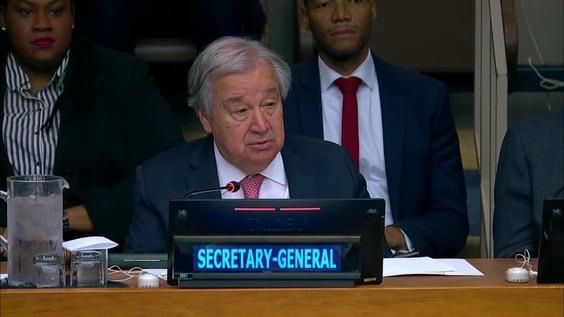Justice Long Overdue: UN Chief Calls for Global Action to Redress Colonial Wrongs
Written By Maxine Ansah
In a rousing address at the Africa Dialogue Series High-level Policy Dialogue in New York, United Nations Secretary-General António Guterres called for a transformative global partnership to deliver justice for Africans and people of African descent. His remarks were firmly anchored in the African Union’s theme for 2025: “Justice for Africans and People of African Descent Through Reparations.”
Speaking to a room of diplomats, policymakers and advocates, Guterres acknowledged the painful legacy of the transatlantic slave trade, colonialism and systemic exploitation. He underscored the urgent need to not only acknowledge historical injustices but to pursue reparatory justice in a comprehensive and collaborative manner.
“Decolonisation did not free African countries or people of African descent from the structures and prejudices that made those projects possible,” Guterres stated. “When African countries gained their independence, they inherited a system built to serve others, not them.”
The Secretary-General was unflinching in his critique of the enduring impact of colonialism. He highlighted how contemporary global governance systems—such as the United Nations Security Council—still reflect the inequalities rooted in a colonial past. Many African countries were under foreign domination when these institutions were created, and their voices remain marginalised today.
In his remarks, Guterres insisted that “reparatory justice frameworks are critical” and must go beyond symbolic gestures. They should address persistent injustices, including the economic exploitation of African resources, systemic racism and the exclusion of African nations from decision-making platforms.
He called for a comprehensive approach developed with the full participation of affected communities to achieve meaningful accountability and redress. “Attempts to repair the past ring hollow unless they also seek to dismantle its manifestations in the present,” he said.
Among the priorities he outlined were:
- Permanent African representation on the UN Security Council, ensuring that Africa has a fair role in shaping global policies.
- Global partnerships for peace, grounded in justice and international law.
- A reformed international financial architecture, to relieve Africa and the Caribbean from suffocating debt and to stimulate investment in social development.
- Action on climate justice, recognising Africa’s minimal role in causing the crisis but its disproportionate suffering from its effects.
Guterres called attention to the glaring energy disparities on the continent. While Africa boasts 60 percent of the world’s best solar resources, it possesses only 1.5 percent of global installed solar capacity. Around 600 million Africans still lack access to electricity. He urged the international community to support Africa in becoming the world’s clean energy powerhouse by increasing investment and ensuring that African nations benefit fully from their critical mineral resources.
The Secretary-General also referenced the second International Decade for People of African Descent as a key platform to advance equal rights, reparations and the commitments of the Durban Declaration and Programme of Action.
His speech comes at a time when trade barriers, declining aid budgets and geopolitical tensions are challenging multilateral cooperation. Yet, Guterres insisted that “these turbulent times do not alter the truth that justice for Africa, for the Caribbean and for all people of African descent requires global action and global partnerships.”
The Financing for Development Conference in Sevilla later this year, he added, will be a crucial moment for securing concrete commitments on debt reform, increased development financing and equitable taxation regimes.
Ultimately, Guterres’ address was both a reckoning and a rallying cry. “We point to the poisoned legacies of enslavement and colonialism not to sow divisions but to heal them,” he said. “Animated by honesty and justice, we can transform the legacies of slavery and colonialism into equal and respectful partnerships.”
As the international community looks ahead to upcoming milestones—from climate negotiations to development financing forums—the Secretary-General’s message is clear: the time for justice is now.








